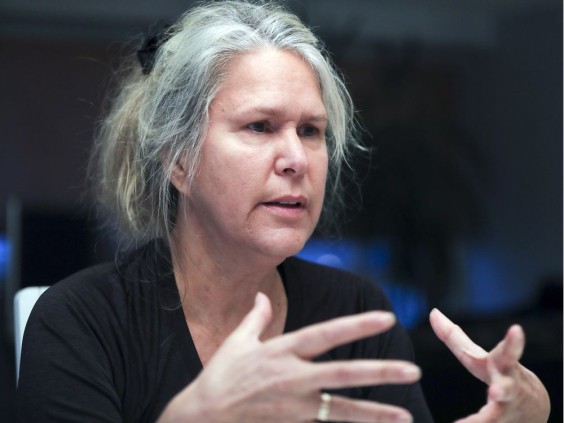
ALS: Canadian patients eligible for inclusion in U.S. clinical trials
Published in the Montreal Gazette March 29, 2018, written by Charlie Fidelman
Nancy Roch speaks about her ALS diagnosis at her apartment in Montreal on Dec. 5, 2017. PHOTO BY JOHN MAHONEY /Montreal Gazette
Experimental treatment shows promise in halting progression of disease over six-month period
Canadian patients with ALS are now eligible to enrol in a study testing a promising experimental treatment shown to halt or reverse disease progression over a six-month period.
Canadians with amyotrophic lateral sclerosis — a deadly neurodegenerative disease for which there is no effective treatment — can be enrolled at one site only, at the University of Massachusetts.
Bowing to pressure from Canadian patients, BrainStorm Cell Therapeutics revised its protocol for the advanced trial that initially was designed for 200 American patients only, at six different sites, CEO Chaim Lebovits told the Montreal Gazette in an interview. The Israeli company then applied for permission with the U.S. Food and Drug Administration (FDA) to allow Canadian patients to participate. Permission was granted Wednesday, for the university centre near Boston.
“There was a strong outpouring from Canadian patients, and they had a good argument,” Lebovits said. They argued that for residents of Montreal and Toronto, getting to Boston would be no more of an inconvenience than for patients from New York.
“We try to help, so we’re pleased to accept patients from Canada,” he said.
BrainStorm had initially wanted to do the Phase III trial of its stem-cell therapies called NurOwn in Canada. It’s not clear why Health Canada has yet to respond to the company’s request made in February 2017.
With NurOwn, the patient’s own cells are harvested from bone marrow and manipulated to produce “growth factors” that help neurons survive; this product is transplanted back into the patients spines.
The study will see how patients react to three infusions, given several months apart. The trial will be double-blind and placebo-controlled, which means neither patients nor investigators will know who is getting the stem cell therapy and who is getting a control substance.
The patient who lobbied the hardest for BrainStorm to open the trial to Canadians is none other than Montrealer Nancy Roch, the former head of French-language programming at Radio-Canada, who is on an experimental drug for ALS that she bought with her own funds after tracking the drugmaker to Japan.
“If you want to stay alive you have to fight. What is so frustrating to me is that I am fighting alone,” said Roch, who is running a battle on three fronts to improve access to new drugs for Canadian ALS patients.
Last week, Roch met with federal Health Minister Jane Philpott to demand more funds for ALS research. She is also asking the provincial order of nurses to allow its members to inject patients with the Japanese-made ALS drug edaravone, which is not approved for use in Canada. Quebec nurses say their code of ethics does not allow them to inject a drug not approved for use in Canada, and so Roch had to hire a nurse in the private sector.
And last, she petitioned BrainStorm.
The disorder affects roughly 3,000 Canadians. But there are few survivors because 90 per cent die within two to three years of diagnosis. Patients typically lose the ability to move, speak, swallow and breathe.
Roch called BrainStorm’s announcement bittersweet “good news.” It is absolutely not fair that Canadians are left out of therapies available elsewhere, she said. “It may be too late for some us.”
Dr. Angela Genge, director of the Montreal Neurological Institute’s ALS Clinical Research Program, is also working to get a NurOwn study established in Canada — at the Neuro.
“I’d like Health Canada to approve it, so Canadian patients can participate and be at home while doing it,” Genge said. “We need to find a way to make it happen so it’s fair for all Canadians.”
NurOwn appears to be quite promising, Genge said, as it allows neurons to stabilize and start functioning again.
Health Canada officials were not able to respond to a query Wednesday on where it stands on the approval of BrainStorm Cell Therapeutics.
Join our fight to #EndALS!
Sign up as to receive periodic email updates and join our circle of supporters!